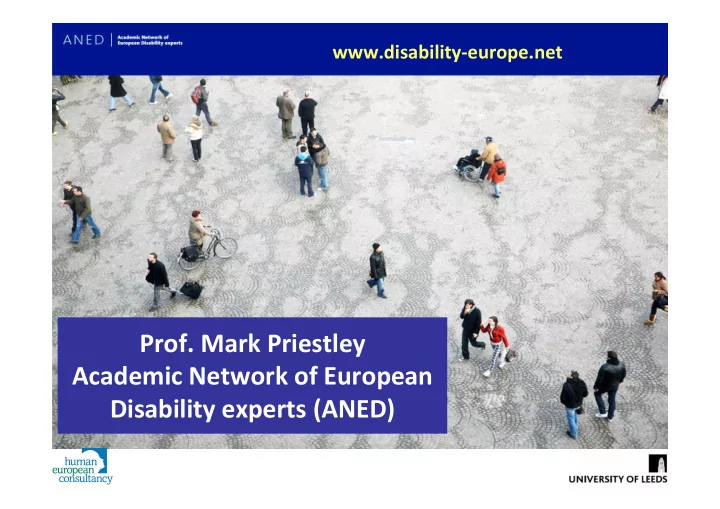

www.disability-europe.net Prof. Mark Priestley Academic Network of European Disability experts (ANED)
www.disability-europe.net Creating Conditions for Independent Living: Autonomy or Dependency?
www.disability-europe.net Thinking about Economic Autonomy? 1. Employment 2. Social protection and incomes 3. Support for independent living 4. Autonomy in an Economic Crisis?
www.disability-europe.net Employment ‘work freely chosen or accepted in a labour market … that is open, inclusive and accessible’ (Article 27) • A significant disadvantage in European labour markets • A significant lack of reliable data for comparison • Lack of attention to accessibility in the workplace • Much variation in active labour market policies • Movement away from sheltered employment? • Extensive use of wage subsidies • Targeted skills training • Support for flexible working • The welfare-work problem (autonomy-dependency?)
www.disability-europe.net Employment • Disability in national Labour Force Surveys. • Targets for the employment rate of disabled women and men. • Activation projects with clear objectives. • Focus on creating accessibility in the working- environment. • Mainstreaming disability in labour market policies. • Flexible routes in and out of the benefit system. • Awareness of accessibility amongst employers. • Focus on the gap for young people between school and the labour market, including education, training and employment.
www.disability-europe.net Social protection and incomes ‘an adequate standard of living for themselves and their families’ (Article 28) • A key target group for national benefit reforms. • Some recent increases in disability benefits… • …but still not a safety net against the poverty trap. • Tackling disability in childhood poverty. • Exclusion from education has lasting effects on income. • Tension between cutting eligibility to work-related disability. benefits and responsibility to ensure adequate incomes.
www.disability-europe.net Social protection and incomes • Highlight the impact of education and employment policies on incomes. • Create policies for flexible working without loss of income. • Compensate the actual costs of disability-related expenses. • Focus on priority groups at risk of exclusion. • Consider the poverty of households (disabled families). • Highlight examples of good practice. • Implement non-discrimination beyond employment. • Involve disabled people and their representatives as active partners in developing strategy and policy.
www.disability-europe.net Support for Independent Living ‘to live in the community, with choices equal to others… community support services’ (Article 19) • New relationships between the individual, the state and service providers. • Some progress on choice and control. • There are still significant investments in institutional care. • Examples of good practice in self-directed support. • There is a lack of knowledge about independent living in some countries. • Free movement remains a significant problem.
www.disability-europe.net Support for Independent Living • Share examples of self-managed personal budget and direct payment schemes. • Consider the economic autonomy of people with all types of impairments (not only a few). • Structural Fund projects should develop economic autonomy through choice and control in the management of support. • Develop co-operation and mutual recognition of personal assistance rights between regions and countries. • Invest in independent living centres and the collective expertise/support of disabled people’s organisations.
www.disability-europe.net Autonomy in an Economic Crisis? • Less evidence of immediate impact than expected, but… • Unemployment concerns in some countries. • Disability-related benefits frozen, cut, or… increased. • Limiting eligibility to disability-related benefits. • More functional or medical assessments of work capacity. • Less progress on the re-organisation of public employment services? • Increased use of wage subsidies. • Opportunities for job creation in the support sector. • Opportunities for investments in accessibility?
www.disability-europe.net Prof. Mark Priestley Centre for Disability Studies University of Leeds
Recommend
More recommend